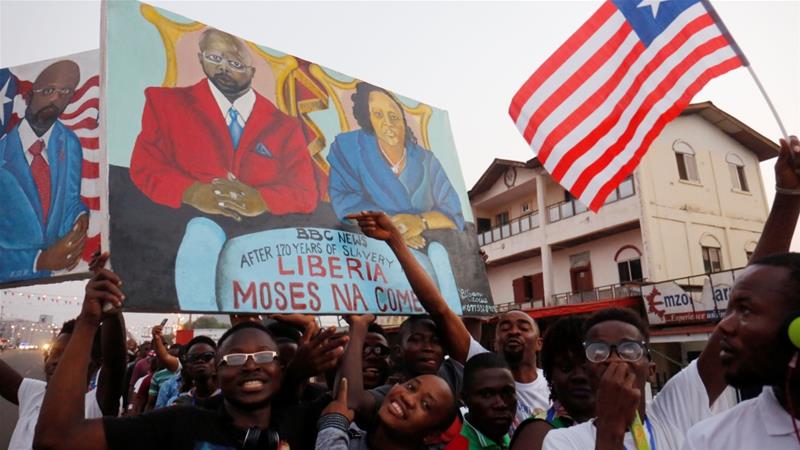
In a historic landmark, marking Liberia’s first peaceful democratic transition since 1944, former international footballer George Weah was sworn in as Liberia’s new president on Monday.
Weah, the leader of the Coalition for Democratic Change (CDC) party, replaced Africa’s first ever female president Ellen Johnson Sirleaf, who completed 12 years in office in two six-year terms as leader of Liberia’s Unity Part
Weah’s inauguration at the Samuel Kanyon Doe Stadium, near the capital Monrovia, confirmed the former football star as the West African nation’s 25th president.
Kenya’s Daily Nation reported that the inauguration was attended by colleagues and former friends as well as heads of state from Ghana, Mali, Nigeria and Togo.
President Jacob Zuma was unable to attend instead sending Minister of Water and Sanitation Nomvula Mokonyane to represent Pretoria.
Liberia, and South Africa share strong economic and trade relations, further cemented during a state visit to South Africa by Sirleaf last year.
Zuma remarked that the peaceful and democratic manner under which the elections in Liberia were conducted signified yet another positive step towards deepening democracy on the African continent.
In Weah’s first attempt at the presidency in 2005 he lost to Sirleaf and subsequently spent the last 13 years fighting for political credibility,including becoming a senator in 2014.
The months preceding Monday’s historic moment were marred with difficulties including a run-off that was postponed after being challenged in court on the grounds that October’s elections – which saw Weah pull 38.4 percent of the vote to Vice President Joseph Boakai’s 28.8 percent – were marred by fraud.
Liberty Party presidential candidate Charles Brumskine, who trailed in third place, claimed ballot stuffing and false voter registration cards marred the election – allegations backed by Boakai.
However, Liberia’s Supreme Court ruled that there was insufficient evidence of fraud to justify a second poll with international observers also reporting the election was largely free and fair.
Further dramatic events unfolded in the weeks before the swearing-in when Sirleaf was expelled from her Unity Party following allegations of interfering with electoral procedures last year – and of actively crossing party lines by supporting Weah.
Sirleaf’s legacy includes maintaining peace following the bloody civil war from 1989-2003, which left approximately 250 000 dead in its wake.
However, poverty is rampant in Liberia and the country sits near the bottom of international rankings for health, education and development.
So Weah has a tough job ahead of him with expectations high that he will successfully tackle Liberia’s struggling economy by delivering on his campaign promises of job creation and an improved education system by building new and better schools.
More than 60 percent of Liberia’s 4.6 million citizens are under 25, and many voted for Weah in the expectation he would quickly boost employment.
There are also concerns that hopes of tackling rampant corruption and the urgent need to bring technocratic expertise into his cabinet might be unforthcoming due to expected political payback for those that supported his presidency.
Weah’s close association with former Liberian war lord Charles Taylor has also cast a cloud over his forthcoming presidency. He has chosen Taylor’s ex-wife, Jewel, to be his deputy.
Liberia was founded by freed American slaves in 1822. The first ship, Mayflower of Liberia departed New York on February 6, 1820, for West Africa carrying 86 settlers.
Between 1821 and 1838, the American Colonisation Society developed the first settlement and on July 26, 1847, it declared its independence.








